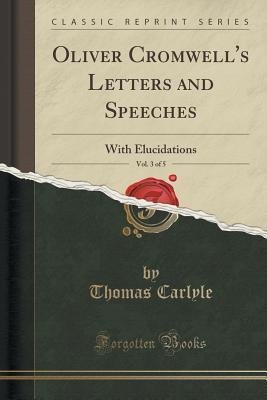Oliver Cromwell's Letters and Speeches, Vol. 3 of 5: With Elucidations (Classic Reprint)
by Thomas Carlyle
Excerpt from Oliver Cromwell's Letters and Speeches, Vol. 3 of 5: With Elucidations
The Lord Said unto my Lord Sit thou at my right hand 'until I make thine enemies thy footstool. The Lord shall send the rod of thy strength out of Zion: rule thou in the midst of thine enemies. Thy people shall be willing in the day of thy power; in the beauties of holiness, from the womb of the morning thou hast the dew of thy youth. The Lord hath sworn, and Will not repent, Thou art a priest forever after the order of Melchizedek. The Lord, at thy right hand, shall strike through Kings in the day of his wrath. He shall judge among the Heathen he shall fill the places with the dead bodies he shall wound the heads over many countries. He shall drink of the brook in the way: therefore Shall he lift up the head.'
About the Publisher
Forgotten Books publishes hundreds of thousands of rare and classic books. Find more at www.forgottenbooks.comwww.forgottenbooks.com
This book is a reproduction of an important historical work. Forgotten Books uses state-of-the-art technology to digitally reconstruct the work, preserving the original format whilst repairing imperfections present in the aged copy. In rare cases, an imperfection in the original, such as a blemish or missing page, may be replicated in our edition. We do, however, repair the vast majority of imperfections successfully; any imperfections that remain are intentionally left to preserve the state of such historical works.
The Lord Said unto my Lord Sit thou at my right hand 'until I make thine enemies thy footstool. The Lord shall send the rod of thy strength out of Zion: rule thou in the midst of thine enemies. Thy people shall be willing in the day of thy power; in the beauties of holiness, from the womb of the morning thou hast the dew of thy youth. The Lord hath sworn, and Will not repent, Thou art a priest forever after the order of Melchizedek. The Lord, at thy right hand, shall strike through Kings in the day of his wrath. He shall judge among the Heathen he shall fill the places with the dead bodies he shall wound the heads over many countries. He shall drink of the brook in the way: therefore Shall he lift up the head.'
About the Publisher
Forgotten Books publishes hundreds of thousands of rare and classic books. Find more at www.forgottenbooks.comwww.forgottenbooks.com
This book is a reproduction of an important historical work. Forgotten Books uses state-of-the-art technology to digitally reconstruct the work, preserving the original format whilst repairing imperfections present in the aged copy. In rare cases, an imperfection in the original, such as a blemish or missing page, may be replicated in our edition. We do, however, repair the vast majority of imperfections successfully; any imperfections that remain are intentionally left to preserve the state of such historical works.
BUY NOW
Paperback, 288 pages
Published April 23rd 2018 by Forgotten Books
© 2025 Bibleportal.com 版权所有.

Thomas Carlyle was a Scottish satirical writer, essayist, historian and teacher during the Victorian era. He called economics "the dismal science", wrote articles for the Edinburgh Encyclopedia, and became a controversial social commentator.
Coming from a strict Calvinist family, Carlyle was expected by his parents to become a preacher, but while at the University of Edinburgh, he lost his Christian faith. Calvinist values, however, remained with him throughout his life. This combination of a religious temperament with loss of faith in traditional Christianity made Carlyle's work appealing to many Victorians who were grappling with scientific and political changes that threatened the traditional social order.
... Show more